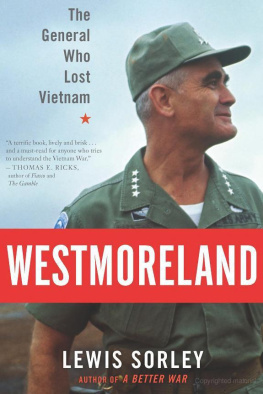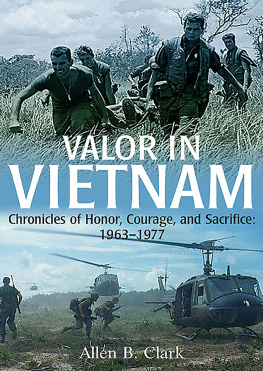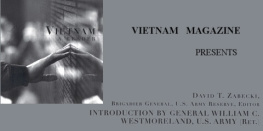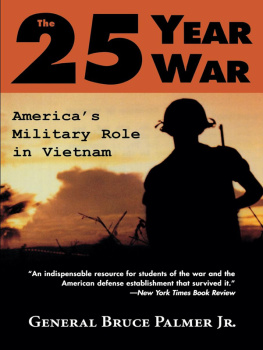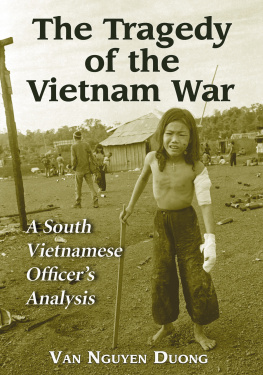Lewis Sorley - A Better War: The Unexamined Victories and Final Tragedy of Americas Last Years in Vietnam
Here you can read online Lewis Sorley - A Better War: The Unexamined Victories and Final Tragedy of Americas Last Years in Vietnam full text of the book (entire story) in english for free. Download pdf and epub, get meaning, cover and reviews about this ebook. publisher: Mariner Books, genre: History. Description of the work, (preface) as well as reviews are available. Best literature library LitArk.com created for fans of good reading and offers a wide selection of genres:
Romance novel
Science fiction
Adventure
Detective
Science
History
Home and family
Prose
Art
Politics
Computer
Non-fiction
Religion
Business
Children
Humor
Choose a favorite category and find really read worthwhile books. Enjoy immersion in the world of imagination, feel the emotions of the characters or learn something new for yourself, make an fascinating discovery.
- Book:A Better War: The Unexamined Victories and Final Tragedy of Americas Last Years in Vietnam
- Author:
- Publisher:Mariner Books
- Genre:
- Rating:5 / 5
- Favourites:Add to favourites
- Your mark:
- 100
- 1
- 2
- 3
- 4
- 5
A Better War: The Unexamined Victories and Final Tragedy of Americas Last Years in Vietnam: summary, description and annotation
We offer to read an annotation, description, summary or preface (depends on what the author of the book "A Better War: The Unexamined Victories and Final Tragedy of Americas Last Years in Vietnam" wrote himself). If you haven't found the necessary information about the book — write in the comments, we will try to find it.
Lewis Sorley: author's other books
Who wrote A Better War: The Unexamined Victories and Final Tragedy of Americas Last Years in Vietnam? Find out the surname, the name of the author of the book and a list of all author's works by series.
A Better War: The Unexamined Victories and Final Tragedy of Americas Last Years in Vietnam — read online for free the complete book (whole text) full work
Below is the text of the book, divided by pages. System saving the place of the last page read, allows you to conveniently read the book "A Better War: The Unexamined Victories and Final Tragedy of Americas Last Years in Vietnam" online for free, without having to search again every time where you left off. Put a bookmark, and you can go to the page where you finished reading at any time.
Font size:
Interval:
Bookmark:
Copyright 1999 by Lewis Sorley
All rights reserved. No part of this publication may be reproduced or transmitted in any form or by any means, electronic or mechanical, including photocopy, recording, or any information storage and retrieval system, without permission in writing from the publisher.
For information about permission to reproduce selections from this book, write to Permissions, Houghton Mifflin Harcourt Publishing Company, 215 Park Avenue South, New York, New York 10003.
www.hmhco.com
The Library of Congress has cataloged the print edition as follows:
Sorley, Lewis, 1934
A better war: the unexamined victories and final tragedy
of Americas last years in Vietnam/Lewis Sorley.
p. cm.
Includes bibliographical references and index.
1. Vietnamese Conflict, 19611975United States. I. Title.
DS558.S65 1999
959.704'3373dc21 99-10495
ISBN 978-0-15-100266-5
ISBN 978-0-15-601309-3 (pbk.)
e ISBN 978-0-547-41745-5
v3.0515
For Judith
You know, its too bad. Abrams is very good.
He deserves a better war.
R OBERT S HAPLEN
New Yorker Correspondent
Saigon 1969
T HE S OUTH V IETNAMESE government awarded campaign medals to Americans who served in the Vietnam War. Each decoration had affixed to the ribbon a metal scroll inscribed 1960 . The closing date was never filled in, perhaps prophetically, since for many Americans the war has never ended. That should not be surprising, for those years constituted one of the most complex and difficult periods the country, and its armed forces, has ever gone througha limited war within the larger Cold War within a global cultural revolution, and ultimately a failed endeavor.
If, as the scroll suggests, American participation is dated from 1960, its early years were primarily advisory. Then, starting in the spring of 1965, American ground forces began deploying to take part in the war, with the supporting air and naval campaigns also expanding proportionately. At the peak, in the spring of 1969, some 543,400 Americans were serving in South Vietnam, with many thousands more operating from ships offshore and airfields in adjacent countries.
In early 1968 there occurred what may now be seen as the pivotal event of the war, at least from the American viewpoint, a series of battles that came to be known as the Tet Offensive. Beginning on the night of 30 January, and intensifying the following night, Communist forces launched a series of coordinated attacks against major population centers all across South Vietnam, violating a truce by timing them to coincide with the celebration of the lunar new year, known as Tet, traditionally a time of peace, brotherhood, and family reunion for all Vietnamese.
The attackersNorth Vietnamese Army and Viet Cong forcessuffered grievous casualties, principally among the Viet Cong indigenous to the South, and the offensive was defeated quickly save in Saigon and Hue, where the fighting raged for a month. More important, however, the psychological effect of these unexpected and widespread assaults was devastating, especially in the United States, where hopes for an early end to the war had been raised by progress reported during the preceding year. General William C. Westmoreland, then commanding U.S. forces in Vietnam, had been particularly sanguine in his predictions, saying in the autumn that he had never been more encouraged in his four years in Vietnam and that we had reached a point where the end had begun to come into view. The contrast between those pronouncements and what now appeared to be happening on the battlefield precipitated a dramatic downturn in the American publics willingness to continue supporting the war.
Soon after Tet 1968 General Westmoreland was replaced as U.S. commander in Vietnam by General Creighton W. Abrams, renowned as a troop leader since World War II, when he commanded a battalion of tanks in the drive across Europe, en route breaking through to the 101st Airborne Division where it was encircled at Bastogne during the Battle of the Bulge, and winning two Distinguished Service Crosses and a battlefield promotion to colonel in the process.
Abrams joined Ambassador Ellsworth Bunker, a patrician Vermonter and international businessman-turned-diplomat, recently acclaimed for dextrous handling of a volatile situation during U.S. intervention in the Dominican Republic. Bunker had settled into the Saigon post the previous spring, thereby ending a long series of frequent ambassadorial changes.
Soon these men were joined by Ambassador William E. Colby, a career officer of the Central Intelligence Agency who had earlier been the Agencys Chief of Station, Saigon, then Chief of the Far East Division at CIA Headquarters. Building a brilliant intelligence career on World War II service with the Office of Strategic Services, service that saw him decorated for valor after parachuting behind enemy lines, Colby arrived to take over American support of the pacification program.
In the wake of Tet 1968, the tasks confronting the new leadership triumvirate were challenging indeed. Americas long buildup of forces was at an end, soon to be supplanted by a progressive reduction in the forces deployed. Financial resources, previously abundant, were becoming severely constrained. Domestic support for the war, never robust, continued to decline, the downward spiral fueled in reinforcing parts by opponents of the war and others deploring inept prosecution of it. Lyndon Johnson had in effect been driven from office by these escalating forces, while Richard Nixons tenure would of necessity constitute an extended attempt to moderate and adapt to them without losing all control.
Whatever the mood of the country, for those in Vietnam the war still had to be fought, and the new leadership went about doing that with energy and insight. Shaped by Abramss understanding of the complex nature of the conflict, the tactical approach underwent immediate and radical revision when he took command. Previously fragmented approaches to combat operations, pacification, and mentoring the South Vietnamese armed forces now became one war with a single clear-cut objectivesecurity for the people in South Vietnams villages and hamlets. And under a program awkwardly tided Vietnamization, responsibility for conduct of the war, largely taken over by the Americans in the earlier period, was progressively turned back to the South Vietnamese.
Most of the better-known treatments of the Vietnam War as a whole have given relatively little consideration to these later years. Stanley Karnows Vietnam: A History, for example, does not get beyond Tet 1968 until page 567 out of 670, and indeed Karnow does not even list Abrams, who served in Vietnam for five years and commanded U.S. forces there for four, in his Cast of Principal Characters.
George Herrings admirable academic treatment of the conflict, Americas Longest War, is similarly weighted toward the early years, with 221 pages devoted to the period through Tet 1968 and 60 pages to the rest of the war. William J. Duikers Historical Dictionary of Vietnam likewise emphasizes the early stages, with entries for Lodge, Taylor, and Westmoreland, but none for Bunker, Abrams, or Colby.
The most pronounced example of concentration on the earlier years is Neil Sheehans Pulitzer Prizewinning book A Bright Shining Lie. Sheehan devotes 725 pages to events through Tet 1968 and only 65 pages to the rest of the war, even though John Paul Vann, the nominal subject of his book, lived and served in Vietnam for four years after the Tet Offensive. And of course the famous Pentagon Papers, first made public in June 1971, cover the war only through the end of Defense Secretary Robert McNaniaras tenure in 1968. William Colby once observed that, due to the prevalence of such truncated treatments of the Vietnam War, the historical record given to most Americans is... similar to what we would know if histories of World War II stopped before Stalingrad, Operation Torch in North Africa and Guadalcanal in the Pacific. To many people, therefore, the story of the early years seems to be the whole story of the war in Vietnam, a perception that is far from accurate.
Next pageFont size:
Interval:
Bookmark:
Similar books «A Better War: The Unexamined Victories and Final Tragedy of Americas Last Years in Vietnam»
Look at similar books to A Better War: The Unexamined Victories and Final Tragedy of Americas Last Years in Vietnam. We have selected literature similar in name and meaning in the hope of providing readers with more options to find new, interesting, not yet read works.
Discussion, reviews of the book A Better War: The Unexamined Victories and Final Tragedy of Americas Last Years in Vietnam and just readers' own opinions. Leave your comments, write what you think about the work, its meaning or the main characters. Specify what exactly you liked and what you didn't like, and why you think so.


